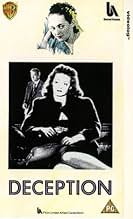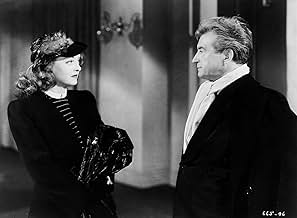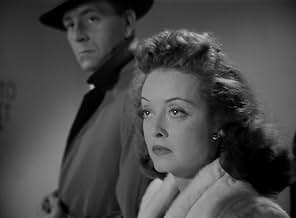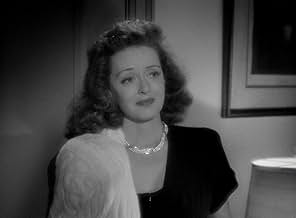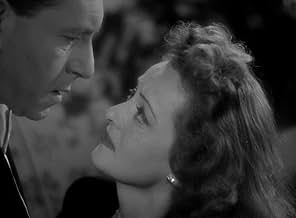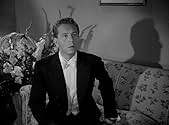AVALIAÇÃO DA IMDb
7,1/10
4,5 mil
SUA AVALIAÇÃO
Adicionar um enredo no seu idiomaAfter marrying her long-lost love, a musician finds the relationship threatened by a wealthy composer who is besotted with her.After marrying her long-lost love, a musician finds the relationship threatened by a wealthy composer who is besotted with her.After marrying her long-lost love, a musician finds the relationship threatened by a wealthy composer who is besotted with her.
- Direção
- Roteiristas
- Artistas
- Prêmios
- 4 vitórias no total
John Alban
- Concertgoer
- (não creditado)
Russell Arms
- Music Student
- (não creditado)
Lois Austin
- Norma - Wedding Guest
- (não creditado)
Patricia Barry
- Music Student
- (não creditado)
Brandon Beach
- Concertgoer
- (não creditado)
Lulu Mae Bohrman
- Restaurant Diner
- (não creditado)
Paul Bradley
- Concertgoer
- (não creditado)
James Carlisle
- Restaurant Diner
- (não creditado)
Gertrude Carr
- Wedding Guest
- (não creditado)
James Conaty
- Well-Wisher at Concert
- (não creditado)
Marcelle Corday
- Hat Check Woman
- (não creditado)
Gino Corrado
- Waiter
- (não creditado)
Suzi Crandall
- Music Student
- (não creditado)
- Direção
- Roteiristas
- Elenco e equipe completos
- Produção, bilheteria e muito mais no IMDbPro
Avaliações em destaque
...Of Claude Rains' character in this picture. As has been stated, he is an older guy who loses out on Bette Davis to a younger guy. The younger guy is Paul Henreid playing a WWII survivor, thought dead by Davis. When she spots him at a concert in NYC years later, the handwriting is on the wall for Rains.
The mise en scene is the world of classical music, about which I know little but which sounds, uh, classical in several pieces played during the film. Henreid plays a cellist, so the pieces for the cello leave me out completely. Rains is a master composer, a genius referred to by his last name, Hollenius, thereby cementing his genius label. Not only is he a genius, he is a vengeful genius.
One does not often encounter such a high level of acting as that found in "Deception", and it elevates the film above the ordinary. All three principals are outstanding, especially Rains, whose performance towers over the other two. It is a character study and a straight drama. Speaking for myself I was not aware of any elements of 'noir', but if you are a fan of good acting, "Deception" is for you, as it is exceptional in this department.
The mise en scene is the world of classical music, about which I know little but which sounds, uh, classical in several pieces played during the film. Henreid plays a cellist, so the pieces for the cello leave me out completely. Rains is a master composer, a genius referred to by his last name, Hollenius, thereby cementing his genius label. Not only is he a genius, he is a vengeful genius.
One does not often encounter such a high level of acting as that found in "Deception", and it elevates the film above the ordinary. All three principals are outstanding, especially Rains, whose performance towers over the other two. It is a character study and a straight drama. Speaking for myself I was not aware of any elements of 'noir', but if you are a fan of good acting, "Deception" is for you, as it is exceptional in this department.
Irving Rapper's "Deception" reunited the three stars of a much better Bette Davis' vehicle: "Now Voyager". This is a film where all three stars shine equally. "Deception" was based on a play and the adaptation has opened it in unexpected ways. This satisfying melodrama has one thing going for it: the great music one hears throughout the movie, it's highlight being the Korngold Cello concerto, a rarity seldom heard, let alone in films. We are also treated to the beginning of Beethoven's Apassionata sonata as well.
Christine Radcliffe is a musician who gets separated from the love of her life, Karel Novak, one of the best cellist of Europe, before the advent of WWII. Christine comes back to New York, where she becomes the lover of a famous composer, Alexander Hollenius. One day, Christine discovers Karel's name playing in a second class venue in Manhattan, where they are reunited.
Christine doesn't have the nerve to tell Karel about what has happened in the intervening years. It's obvious Christine has done well for herself, as Karel discovers Christine lives in a great apartment, he finds closets full of elegant and expensive clothes, furs, jewelry, which doesn't make sense to him. Little does he know everything has come out of the generosity of Alexander Hollenius, a composer that fell in love with Christine and obviously, became her lover. Christine is coy in not revealing the truth, which keeps interfering with her happiness, until it comes to a head as Hollenius threatens Christine to tell it all to Karel after he plays the concert. It's at that point that Christine realizes she is cornered and must face reality and the fact that she will lose the man she really loves.
Bette Davis made a fine Christine, a woman she was born to play. Ms. Davis is amazing in the film, which unfortunately, is forgotten by all her admirers when comparing this role to her other great screen portraits. Claude Rains, who worked so well with Ms. Davis, gives an incredible performance as the egotistical composer who is afraid to lose his own creation. This has to be one of Mr. Rains' best appearances in a film. Paul Henried is perfect as Karel, the European cellist madly in love with Christine, a woman he thought he had lost forever. Mr. Henried is an elegant figure in this film, something that he projected effortlessly.
Ernest Haller's cinematography greatly enhances all we see on the screen. Mr. Haller was one of the best photographers working in that period, as he clearly shows here. George James Hopkins' sets not only are opulent, but he clearly knew how to get the most of his interior designs.
The film is an engrossing tale that will satisfy the fans of this genre.
Christine Radcliffe is a musician who gets separated from the love of her life, Karel Novak, one of the best cellist of Europe, before the advent of WWII. Christine comes back to New York, where she becomes the lover of a famous composer, Alexander Hollenius. One day, Christine discovers Karel's name playing in a second class venue in Manhattan, where they are reunited.
Christine doesn't have the nerve to tell Karel about what has happened in the intervening years. It's obvious Christine has done well for herself, as Karel discovers Christine lives in a great apartment, he finds closets full of elegant and expensive clothes, furs, jewelry, which doesn't make sense to him. Little does he know everything has come out of the generosity of Alexander Hollenius, a composer that fell in love with Christine and obviously, became her lover. Christine is coy in not revealing the truth, which keeps interfering with her happiness, until it comes to a head as Hollenius threatens Christine to tell it all to Karel after he plays the concert. It's at that point that Christine realizes she is cornered and must face reality and the fact that she will lose the man she really loves.
Bette Davis made a fine Christine, a woman she was born to play. Ms. Davis is amazing in the film, which unfortunately, is forgotten by all her admirers when comparing this role to her other great screen portraits. Claude Rains, who worked so well with Ms. Davis, gives an incredible performance as the egotistical composer who is afraid to lose his own creation. This has to be one of Mr. Rains' best appearances in a film. Paul Henried is perfect as Karel, the European cellist madly in love with Christine, a woman he thought he had lost forever. Mr. Henried is an elegant figure in this film, something that he projected effortlessly.
Ernest Haller's cinematography greatly enhances all we see on the screen. Mr. Haller was one of the best photographers working in that period, as he clearly shows here. George James Hopkins' sets not only are opulent, but he clearly knew how to get the most of his interior designs.
The film is an engrossing tale that will satisfy the fans of this genre.
I have just finished reading all of the comments here and now let me add my two cents worth. This is my all time favorite Davis opus and it is certainly not because of the high quality of her performance. See Davis at her best in The Letter. What Deception is is a high powered duel between flamboyant personalities (Davis and Rains) wiping their costar (Henreid) right off the screen. The restaurant scene deserves all the mention it got here previously, but how about mink coated Bette confronting Rains in his bed reading Dick Tracy? The screen crackles with vitriol. This is over the top screen acting at it's most enjoyable.If you've never seen this, take the opportunity and enjoy it for what it is: good old fashioned Hollywood entertainment.
How did I never come across Deception (1946) before? It's got to be Claude Rains' most delicious role. He absolutely has a blast playing the grand, tyrannical, jealous composer who hates giving Bette up to Paul Henreid, her former lover who has just returned from Europe at the end of the war. Both men are wickedly jealous of each other. The scene where the great composer unexpectedly arrives at Bette's and Paul's festive wedding party at her great loft apartment overlooking the river in New York (modeled on Leonard Bernstein's apartment) and trades poisonous banter with Bette and Paul makes the movie worth it by itself. But every scene is a gem, such as the scene where Claude takes them to a haute cuisine French restaurant and spends 10 minutes going back and forth over whether to order pheasant, trout, or saddle of lamb and whether to go with a Hermitage or a Vosne Romanee wine. This is some of the sharpest, wittiest dialogue I've seen in a movie, rivaling Ernst Lubitsch and every bit as good as in All About Eve. Oh, and I forgot to mention the amazingly good symphony performance scenes, with an original cello concerto by Korngold, ("played" by Henreid with the arms of two real cellists reaching in from either side to play the instrument). And Bette, a trained pianist, playing Beethoven at her wedding party (she really wanted to play it herself but Jack Warner decided against it but you can see she knows what she's doing in fingering the keys). If you haven't seen it, do check it out.
I'll dispense with the details of the plot and move directly to Mr. Rains' performance as Hollenius the composer in this musico-melodrama.
This is his show although Davis and Henreid attempt to hold their own in this film.
His flair for manipulation and deception, hence the title, dominates the film.
He does a great job of it, driving everyone crazy with his shenanigans and jealousy.
The cinematography is well done and the story's setting in the world of post-WW II classical/modern music is interesting.
I noted that early on, for instance, as Henreid finished a performance, audience members asked him who his favorite living composer was..."Sibelius...or Shostakovich...?" No mention of Aaron Copland or the many other composers alive at the time.
Hollenius' work as a composer was a curious mix of tonal, traditional and slightly atonal influences, attempting to display "modern" music but watered down to keep the audience and us interested.
The mimicking of the piano and cello performances by all three actors was fairly well done.
I found it quite interesting too that both Davis and Rains were not "starving artists" like Henreid. Opulent apartments and lifestyles for piano teachers and composers were not common, but these two were well-off in an even garish sense.
This was not the reality of the time in the music world.
I'd recommend this film if you're a Rains or Davis fan. Henreid was not used for his full potential.
This is his show although Davis and Henreid attempt to hold their own in this film.
His flair for manipulation and deception, hence the title, dominates the film.
He does a great job of it, driving everyone crazy with his shenanigans and jealousy.
The cinematography is well done and the story's setting in the world of post-WW II classical/modern music is interesting.
I noted that early on, for instance, as Henreid finished a performance, audience members asked him who his favorite living composer was..."Sibelius...or Shostakovich...?" No mention of Aaron Copland or the many other composers alive at the time.
Hollenius' work as a composer was a curious mix of tonal, traditional and slightly atonal influences, attempting to display "modern" music but watered down to keep the audience and us interested.
The mimicking of the piano and cello performances by all three actors was fairly well done.
I found it quite interesting too that both Davis and Rains were not "starving artists" like Henreid. Opulent apartments and lifestyles for piano teachers and composers were not common, but these two were well-off in an even garish sense.
This was not the reality of the time in the music world.
I'd recommend this film if you're a Rains or Davis fan. Henreid was not used for his full potential.
Você sabia?
- CuriosidadesPaul Henreid could not play the cello. While he was able to fake it in the long shots, to achieve the illusion in closeup, he wore a special jacket with no sleeves and holes for two real cellists to insert their arms - one to bow, and one to accurately finger the music - while seated behind him, out of shot.
- Erros de gravaçãoWhile Christine, alone in her studio, is talking to Alexander Hollenius on the telephone, the highly visible shadow of a crew member is moving back and forth across the piano behind her.
- Citações
Alexander Hollenius: [snatches his bleeding hand away from Christine] Like all women - white as a sheet at the sight of a couple of scratches... calm and smiling like a hospital nurse in the presence of a mortal wound... Good night!
- ConexõesEdited into Cliente Morto Não Paga (1982)
- Trilhas sonorasHollenius' Cello Concerto
Music by Erich Wolfgang Korngold
Performed by Paul Henreid (dubbed by Eleanor Slatkin)
Principais escolhas
Faça login para avaliar e ver a lista de recomendações personalizadas
- How long is Deception?Fornecido pela Alexa
Detalhes
- Tempo de duração1 hora 55 minutos
- Cor
- Proporção
- 1.37 : 1
Contribua para esta página
Sugerir uma alteração ou adicionar conteúdo ausente




